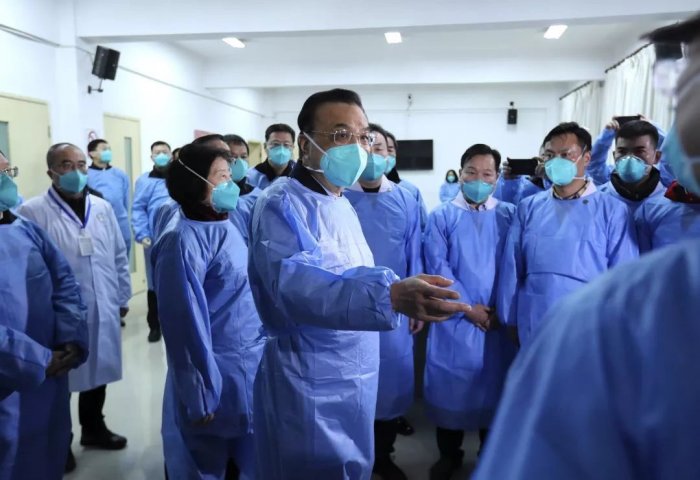China Coronavirus Epidemic Updates : Death Toll Now 91, Infected 2874, Critical Condition 426, Under Observation 32,175, Australia Has A New Case
Source: Thailand Medical News Jan 27, 2020 5 years, 2 months, 4 weeks, 2 days, 12 hours, 9 minutes ago
China health authorities in
Wuhan as of 4.30pm, Bangkok time released figures showing the death toll is now 91, with one new death in the province of Hainan (an 80 year old woman) and the rest in Hubei. The number of infected has risen to 2874 with many new cases emerging in Beijing, Shanghai and Chongqing. The authorities said that 426 individuals were in critical condition while more than 32,175 people were under observations.
 Chinese Premier Li Visiting Hospitals In Wuhan today
Chinese Premier Li Visiting Hospitals In Wuhan today
Australia meanwhile has a new case bring its total to 5. The new infected individual is a female Chinese student from the University Of New South Wales who just returned from
China a few days ago.
The current number of infected cases internationally stands as :
Thailand (8 cases), Hong Kong (8 cases), United States (5 cases), Macau (5 cases), Australia (5 cases), Singapore (4 cases), Malaysia (4 cases), Taiwan (4 cases), South Korea (4 cases), Japan (3 cases), France (3 cases), Vietnam (2 cases), Canada (1 case), Nepal (1 case), Mexico (1 case) and Africa-Cote d’Ivoire (1).
Hong Kong now has 390 suspected cases under observation while Philippines has 11 under observation and
Thailand about 24 under observation for
coronavirus infections.
Some of the disturbing aspects of this
coronavirus epidemic however is a statement by the Mayor of
Wuhan, Zhou Xianwang who said that about 4.79 million
Wuhan residents had left the city just before the lockdown with about 9 million remaining. Of these, about 3.65 million had travelled to other parts of
China while about 1.14 million had travelled internationally some directly via airports in Hubei while other through other airports in
China. ( It is rumoured that
Thailand received the bulk of them.)
Another disturbing fact was that
China’s Health Minister, Ma Xiaowei had publicly announced that those infected but were not showing any symptoms could still spread the disease through the exhaled air. Another point that was also brought up by him was that the
incubation period of the
2019-nCoV virus was between 1 to 14 days! (The
SARS coronavirus was only 2 to 7 days while the MERs
coronavirus was between 2 to 5 days.)
Another disturbing revelation is that all new deaths reported in the last 48 hours were basically due to what is known as “
cytokine storms” resulting in rapid organ failures. This w
as unlike the initial deaths in which patients suffered either severe pneumonia like conditions and sometimes kidney failure. This has implications that the
virus is
mutating but other health officials from China and Europe have claimed that this is not the case and that the
virus has not mutated.
New studies from Germany have confirmed that the new
2019-nCoV virus is genetically similar to the
SARS coronavirus by almost 84 percent. Also the new
virus can remain active out of a host on surfaces at room temperature (between 20 to 30 degrees Celsius) for about 48 hours or two days. At temperatures lesser it can survive longer , at 4 degrees Celsius, it can survive for as long as 28 days.
German virologists brings coronavirus inhibitors to China
Professor Dr Rolf Hilgenfeld, a German coronavirus research expert and Professor at Lubeck University, has brought two types of inhibitors developed for
Sars-CoV to China to test their effects on the
2019 novel coronavirus (
2019-nCoV).
Dr Hilgenfeld and his team have been devoted to the research of
Sars-CoV inhibitors for many years. The inhibitor uses protease acting on the
virus to prevent the protein from cracking, thus preventing the formation of the mature
virus.
Currently, the preparation developed by the team is effective in mice infected with
Sars-CoV and stable in human cell culture experiments.
Medical scientists have found that the
2019-nCov is 80 per cent similar to the
Sars-CoV, and the similarity between the protease of these two
viruses is as high as 96 per cent. Dr Hilgenfeld hopes that the inhibitors can help the research on
2019-nCov drugs.
He told
Thailand Medical News that the experiments on
2019-nCov will be carried out on mice, and toxicological experiments will be carried out to eliminate other side effects that may be caused by the drugs. Finally, mass production will be possible only through clinical trials.
According to him, the
coronavirus is self-limiting. After a period of time, when enough people produce antibodies, the continuous spread of the
virus can be restricted, thus ending the spread of the
epidemic.
